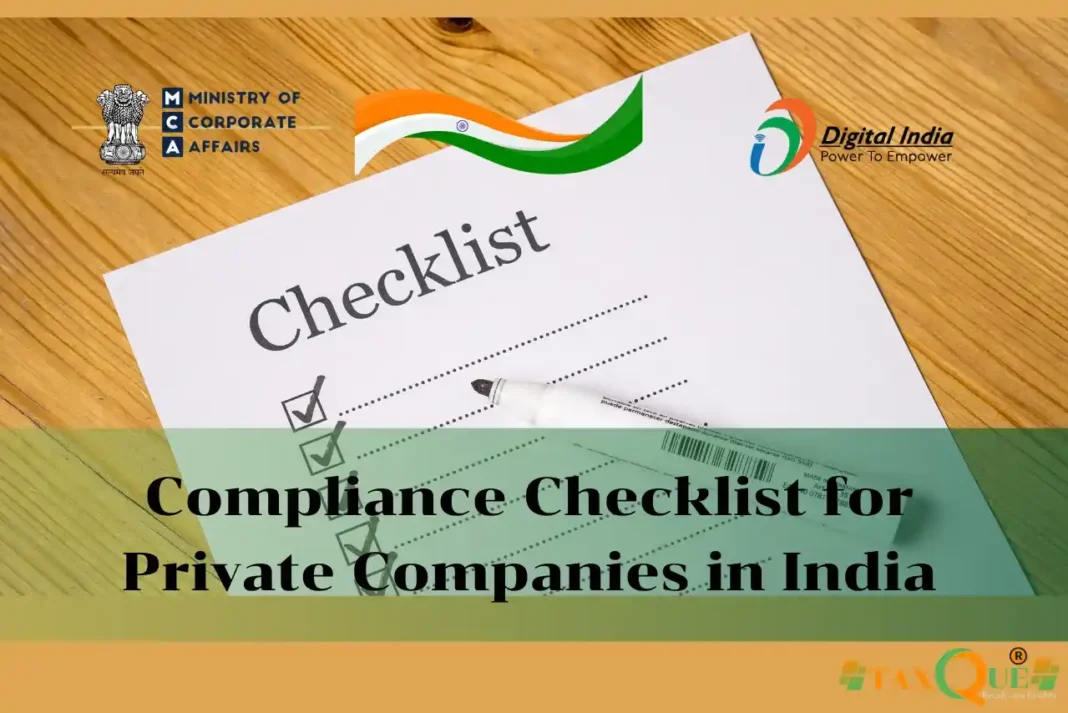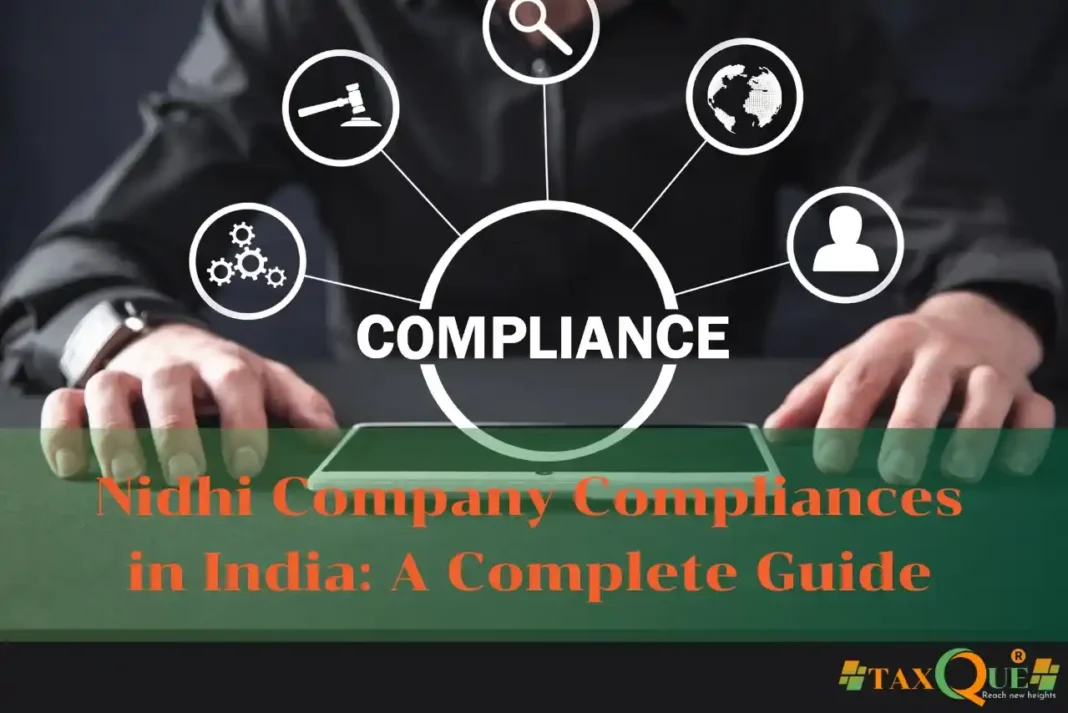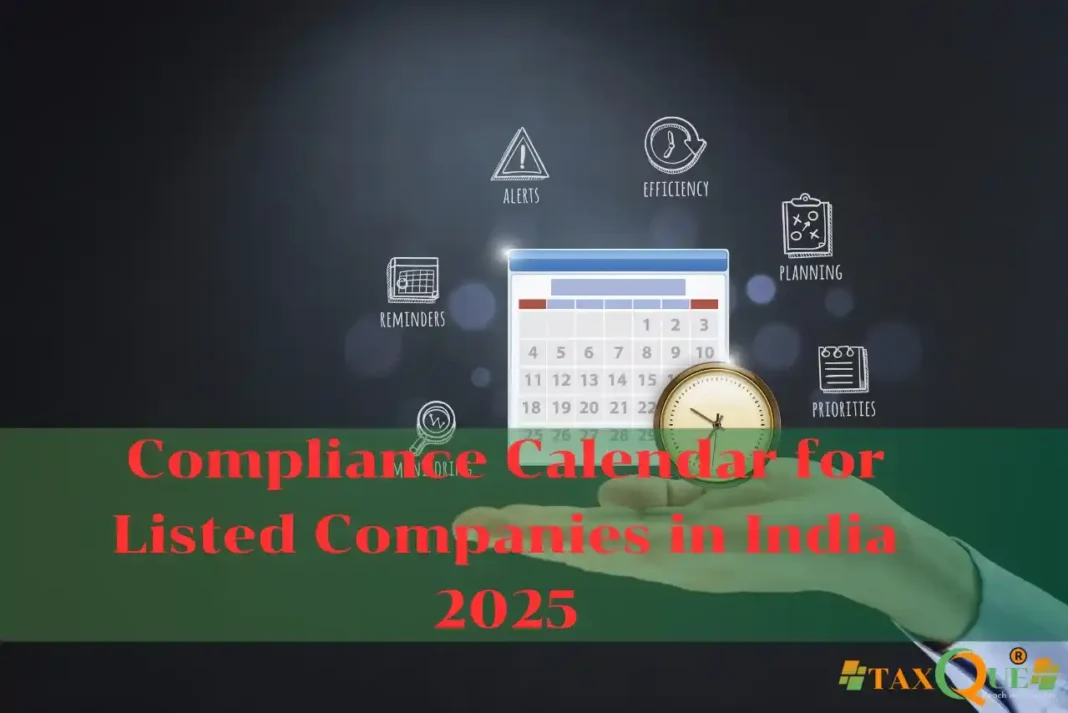Introduction
Compliance checklist for private companies is an essential guide for private limited companies in India to meet statutory, tax, and regulatory obligations. Ensuring timely adherence to laws like the Companies Act, 2013, Income Tax Act, 1961, and GST Act prevents penalties and fosters trust with stakeholders. This blog provides a detailed compliance checklist for private companies, outlining key tasks, deadlines, and how TaxQue simplifies the compliance process for businesses.
What Is a Compliance Checklist for Private Companies?
A compliance checklist for private companies is a structured list of mandatory filings, audits, and governance tasks that private limited companies must complete to remain legally compliant. It covers obligations with the Registrar of Companies (ROC), tax authorities, and other regulators, ensuring transparency and operational legitimacy.
1. Key Components of the Compliance Checklist
The compliance checklist for private companies includes:
- ROC Filings: Annual financial statements and returns.
- Tax Compliance: Income tax, GST, and TDS filings.
- Audits: Statutory and tax audits for financial accuracy.
- Corporate Governance: Board meetings and Annual General Meetings (AGM).
- Labour Law Compliance: Adherence to PF, ESI, and employee regulations.
2. Detailed Compliance Checklist
Here’s a comprehensive compliance checklist for private companies for FY 2025-26:
| Compliance Task | Requirement | Frequency/Deadline |
|---|---|---|
| Form AOC-4 (Financials) | File balance sheet and P&L statement | Annual, within 30 days of AGM (October 30) |
| Form MGT-7 (Annual Return) | File shareholder and director details | Annual, within 60 days of AGM (November 29) |
| Form ADT-1 | Notify auditor appointment | Annual, within 15 days of AGM (October 15) |
| ITR-6 (Income Tax Return) | File company’s income tax return | Annual, October 31 (non-audit) |
| GSTR-9 (GST Annual Return) | File consolidated GST return | Annual, December 31 |
| TDS Returns (24Q, 26Q) | Report deducted tax | Quarterly, 31st of next month post-quarter |
| Statutory Audit | Audit financials by a chartered accountant | Annual, before AGM (September 30) |
| AGM | Hold annual general meeting | Annual, September 30 |
| Board Meetings | Conduct minimum 4 meetings | Quarterly, max 120-day gap |
| PF/ESI Returns | File contributions for employees | Monthly, 15th of next month |
- ROC Filings: File Form AOC-4 (financials) and MGT-7 (annual return) after the AGM (by September 30) via the MCA portal. Form ADT-1 confirms auditor appointment.
- Tax Filings: Submit ITR-6 by October 31 (non-audit) or November 30 (audit cases) on the Income Tax portal. File GSTR-9 by December 31 and monthly/quarterly GST returns (GSTR-1, GSTR-3B) via the GST portal.
- Audits: Conduct a mandatory statutory audit annually; tax audits are required if turnover exceeds ₹10 crore (Section 44AB).
- Meetings: Hold at least 4 board meetings and 1 AGM annually.
- Labour Laws: File PF/ESI returns monthly if employing 10+ staff.
3. Steps to Follow the Compliance Checklist
Follow these steps to ensure the compliance checklist for private companies is met:
Step 1: Appoint Auditors
- Appoint a chartered accountant within 30 days of incorporation for statutory audits.
- Conduct audits before the AGM to prepare AOC-4 filings.
Step 2: Conduct Statutory Meetings
- Hold 4 board meetings (max 120-day gap) and an AGM by September 30.
- Approve financials, auditors, and dividends (if any) at the AGM.
Step 3: File ROC and Tax Returns
- Submit Form AOC-4, MGT-7, and ADT-1 for ROC compliance post-AGM.
- File ITR-6, TDS returns, and GST returns (GSTR-9, GSTR-1, GSTR-3B) as per deadlines.
Step 4: Maintain Records
- Update statutory registers for directors, members, and charges.
- Keep accurate books of accounts and meeting minutes.
Step 5: Monitor Deadlines
- Use a compliance calendar to track ROC, tax, and labour law deadlines.
- Leverage TaxQue for automated reminders and expert filing support.
4. Penalties for Non-Compliance
Failing to follow the compliance checklist for private companies can result in:
- Fines: ₹100/day for late ROC filings (AOC-4, MGT-7); ₹200/day for late GST returns; ₹5,000 for late ITR.
- Director Disqualification: Non-compliance for 3 years may bar directors.
- Legal Risks: Company dissolution or loss of stakeholder trust.
TaxQue simplifies the compliance checklist for private companies with expert support for ROC, GST, and ITR filings. Visit TaxQue’s ROC compliance guide or GST filing services for seamless solutions.
FAQs
1. What are the key ROC filings in the compliance checklist?
Form AOC-4 (financials), MGT-7 (annual return), and ADT-1 (auditor appointment) are mandatory, due by October 30, November 29, and October 15, respectively.
2. Is GST filing mandatory for all private companies?
GST filing is required if turnover exceeds ₹20 lakh (services) or ₹40 lakh (goods); otherwise, it’s optional.
3. What happens if I miss ITR filing deadlines?
Late ITR-6 filing incurs a penalty of up to ₹5,000 and interest under Section 234A.
4. Are audits mandatory for all private companies?
Yes, statutory audits are mandatory for all private companies, as part of the compliance checklist for private companies.
5. How does TaxQue assist with the compliance checklist?
TaxQue offers automated deadline tracking, form preparation, and expert support for ROC, GST, and ITR filings. Explore TaxQue’s compliance services.
Conclusion
The compliance checklist for private companies is a roadmap to legal and operational success in India. From ROC filings to GST, ITR, and audits, timely adherence prevents penalties and builds credibility. Platforms like TaxQue streamline the compliance checklist for private companies with user-friendly tools and expert guidance. Stay proactive, follow the checklist, and ensure your company thrives compliantly.





